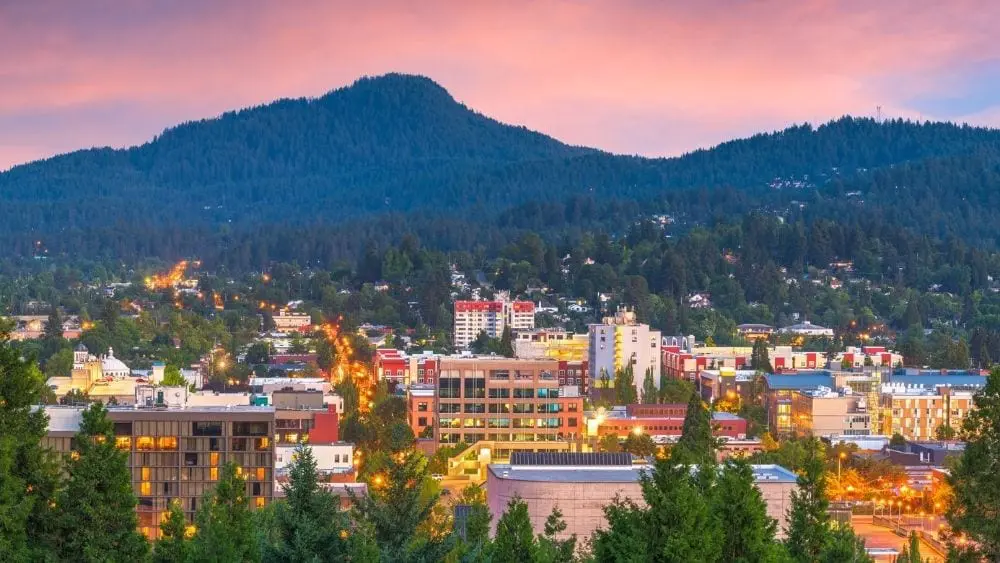
Are you a first-time homebuyer with your sights set on moving to Oregon? With mountains and forests, striking coastlines, and lush river valleys, the Pacific Northwest state is a natural beauty. It’s also known for its hundreds of breweries, vineyards and coffee houses, as well as its overall laidback, environmentally-friendly vibe. In short, it’s a great state to call home.
Homeownership is a milestone that takes some work, though. Homebuyers need to save up for a sizable down payment, secure a low-interest home loan, and commit to decades of mortgage payments along with other homeownership costs.
Thankfully, there is plenty of help for first-time homebuyers in Oregon embarking on the biggest purchase of their lives. Statewide and local homeownership assistance programs are readily available to help you with big ticket items, from chipping in with your down payment and closing costs to helping you score a great fixed rate mortgage. Ultimately, these resources could save you tens of thousands of dollars.
Read on to learn more about these programs, their eligibility requirements and how to apply.
Who Qualifies as a First-Time Homebuyer in Oregon?
For a quick clarification, a first-time homebuyer in Oregon is defined as any family or individual who has never owned a home or at least not in the past three years depending on the region. All of the state programs, for example, suggest residents are still eligible if they haven’t owned a home in the past three years. It’s worth waiting it out if you’re nearing the three-year mark because these programs provide a significant financial boost.
As always, when you’re doing your research, read the fine print and any limitations we list below.
Statewide Homeownership Assistance Programs
Every state has its official housing authority that offers a series of homebuyer programs to help residents with buying a home. The Oregon Housing and Community Services, part of the state government, with the department runs a few programs to help first-time homebuyers with buying their first property.
We’ve also included two initiatives organized by the Oregon Department of Revenue and the Oregon State Legislature.
Here’s a closer look at each program’s details.
OHCS Oregon Bond Residential Loan Program
The OHCS runs a duo of nearly identical programs, the first is the Oregon Bond Residential Loan program with a “Rate Advantage.” With this stream of the program, homebuyers can apply for a 30-year fixed-rate mortgage. With these home loans set at below-market interest rates, you can expect to have a lower monthly payment, saving you thousands of dollars.
You can add on to the program with a “Cash Advantage,” which provides an grant of up to three percent of your home loan’s amount to help you pay closing costs. The OHCS clearly states that you must have your own 3.5 percent down payment and you cannot use your cash advantage funding for your down payment; you can only apply this to your closing costs and other expenses tied to your purchase, like your appraisal, inspection, and title search.
To apply, you must go through the entire loans process with an Oregon Bond Residential Loan Program-approved lender. The OHCS notes the process shouldn’t take longer than other non-OHCS loans.
Your home purchase must be used as your primary residence. If your previous home ended up in bankruptcy court, five years must have elapsed before using an Oregon Bond loan for a new purchase.
You must not have owned a home in the last three years. The priority is also on helping low- to middle-income households secure a home loan so your household income will come into consideration. You also need to stay within purchase price limits set by the OHCS.
Read more about the Oregon Bond Residential Loan Program, including the duo of Cash Advantage and Rate Advantage programs, on the Oregon government’s website, and view their Frequently Asked Questions.
You can find a participating lender here.
OHCS Down Payment Assistance Program
The OHCS also runs a generous Down Payment Assistance program, providing up to $15,000 to help you cover your down payment and closing costs.
The funding is provided to regional organizations across the state, including the Portland Housing Center, Willamette West Habitat for Humanity, and NeighborWorks Umpqua.
It’s worth checking the full list of agencies that receive this funding to help first-time homebuyers. If your region is on the list, and you’re a low- to moderate-income household, this could be a big financial boost to help you with your down payment. Overall, there are about 20 organizations that have been awarded this funding and they cover nearly three dozen regions across Oregon.
Each organization has its own terms and conditions. Across the board, you will have to complete a homebuyers’ education course and contribute at least $1,000 of your own funds towards your home purchase.
Check out the full details for the OHCS Down Payment Assistance program on its official webpage. If you’re interested in enrolling immediately for a homebuyers’ education course, here’s where you can sign up.
Oregon First-Time Homebuyer Savings Account
Depending on the state where you live, some homebuyers are treated to another perk in the form of a First-Time Homebuyer Savings Account, which is a special type of bank account to help homebuyers save up for their big purchase. This extra help extends to families in Oregon.
Account holders can contribute up to $5,000 (or $10,000 joint) tax-free each year to a dedicated down payment savings account. You can subtract your contributions, including your earnings from the account, on your income taxes. You must list yourself as the beneficiary of the account but you can change it at any time, as long as there is only one designated beneficiary at any time.
The cash in your savings account can only be used for expenses related to buying your first home, specifically your down payment and closing costs.
To qualify, you must be a first-time homebuyer or a buyer who hasn’t owned a home in at least three years. You must be a resident of Oregon purchasing a home in the state. Your contributions must remain in your account for at least 90 days before use and may not remain there for longer than a decade. Remember, the cash can only be used towards your home purchase.
Most banks across Oregon offer this savings account. Check with your bank to start the process of opening your account.
Read more about the Oregon First-Time Homebuyer Savings Account on the Oregon Department of Revenue’s website.
Oregon Individual Development Accounts
Oregon State Legislature and the OHCS teamed up with community organizations across the state to create the Oregon Individual Development Accounts program.
IDAs are matched savings accounts to help low income Oregonians save up for a financial goal, such as buying a home or paying for higher education. Along the way, accountholders take courses in budgeting, saving and investing in their future.
For every dollar an accountholder saves, the program matches three dollars.
To date, more than 15,000 Oregon residents spanning 36 countries have IDAs.
To read more about the program and its eligibility requirements, check out the Oregon Individual Development Accounts official webpage here, along with its brochure.
Homebuyer Programs by Location in Oregon
While the statewide programs listed above can give you a leg up on your journey to homeownership, there are local homebuyer assistance programs across Oregon worth doing your research on too.
Read more for our list of local programs.
Bend-Redmond

If you’re a low-income household dreaming of buying a home in Bend or Redmond, look into the region’s Habitat for Humanity chapter. They build and sell 15 affordable homes per year with mortgages set at approximately 33 percent of your household income, making homeownership attainable for many.
To qualify, you must meet income requirements that show you’re priced out of the market. You must not have filed for bankruptcy in the past four or five years, and you must not have any collections, liens or judgments against you. You also must contribute at least $2,000 towards your home’s closing costs and have a credit score of at least 620.
Habitat for Humanity also insists you add some sweat equity into your new home, too. You must volunteer 150 hours into your home’s construction, plus secure another 100 donated hours from your community.
If you’re interested in this project and you’re living in or moving to the Bend-Redmond area, here’s a look at the Habitat for Humanity program. Read the application and program qualifications here.
Central Oregon

Are you ready to set down roots in Central Oregon? Neighbor Impact, with its headquarters in Redmond, is available to help you with everything from one-on-one coaching to providing closing costs assistance in the form of a $1,000 grant.
Neighbor Impact has homebuyers’ education workshops and individual coaching services to help you navigate securing a mortgage to saving up for closing expenses.
It also provides $1,000 in closing costs assistance via a program called On the Home Stretch. To be eligible, your household income must not exceed $107,100, and your home must be located in Central Oregon.
Neighbor Impact partnered with First Story, a local non-profit, to provide affordable homes in Sisters, OR. The homes are sold by First Story to low-income households through 30-year, zero percent interest loans with no down payment required. In this case, your total household income must be at 80 percent or below the Area Median Income.
If you’re curious about any of these programs or services, here’s a rundown of the initiatives on the Neighbor Impact website. It’s worth noting Neighbor Impact services Deschutes, Crook and Jefferson counties and the Confederated Tribes of Warm Springs.
Douglas County

If you’re zeroing in on Coos, Curry, Klamath or Douglas County, take a look at the services and programs NeigborWorks Umpqua runs.
The not-for-profit organizes programs to help you build your dream home, make home repairs or avoid foreclosure if you’re struggling with mortgage payments.
For first-time homebuyers, there are Down Payment Assistance programs and 502 loans. With the NeighborWorks DPA, homebuyers can apply for zero percent interest loans worth up to $10,000 for first-time homebuyers to cover off a portion of their down payment and closing costs. The loans are completely deferred and do not need to be repaid until you sell or refinance your property.
You can read the eligibility requirements here, including household income limits and purchase price limits.
The 502 Direct Loan provides low-income households with a package to help them get approved for a home loan. More details can be found here.
If you’re curious about the extensive list of offerings from NeighborWorks Umpqua, check out the organization’s website.
Eugene

Are you shopping for a home in Eugene-Springfield? The City of Eugene offers its own homebuyer assistance program specifically to help low-income families. If you’re eligible, you can receive up to $10,000 in down payment assistance in a deferred loan; repayment is not required until you sell, refinance or pay off your mortgage.
The program is set aside for first-time homebuyers and anyone who hasn’t owned a property in the past three years. You must provide 50 percent of the total required down payment, and you must purchase a single-family residence or qualifying condo with a maximum purchase price of $209,000. Income limits are also outlined.
You can read more about the program on the City of Eugene website.
Jackson County

If you have your heart set on moving to Jackson County, the region’s ACCESS Building Community is worth checking out as you go through the homebuying process.
If you’re a first-time homebuyer who hasn’t owned a home in the past three years, you may be able to qualify for the HOME Foundation First-Time Buyer Assistance program. The comprehensive program connects you with a pre-purchase counselor and a participating lender who will help you get pre-approved for a mortgage. You can receive up to $1,000 in free grant money to help with your closing costs, too.
You must contribute a minimum of $500 of your own funds towards your home purchase, and you must attend a homebuyers’ education workshop. Household income limits also apply – you shouldn’t earn more than $63,400.
There is an identical program that’s available to military personnel, called the Welcome Home Program for Military Veteran First-Time Homebuyers.
ACCESS also administers the Oregon Homeowner Stabilization Initiative (OHSI), which helps households who are struggling with their monthly mortgage payments, are behind on property taxes or are facing loan default.
See the full details on the ACCESS official website.
Northeast Oregon

If you’re house hunting in Baker, Grant, Union or Wallowa counties, the Community Connection of Northeast Oregon can help you whether you’re a veteran buying a home or a family that needs assistance with securing a home or a down payment.
The organization’s Housing Resource Center runs homeownership education courses and individual counseling that’s free of charge. They can also refer you to realtors, lenders, and mortgage brokers that provide low-interest loans, down payment and closing cost assistance.
Community Connection also runs a Veterans Down Payment Assistance Loan program for any veterans and military service members in Baker, Grant, Union and Wallowa on a first-come, first-served basis. The program comes with a long list of eligibility criteria, including credit score, debt-to-income ratios, and limits on your home’s purchase price. You can read the full list of requirements for the veterans’ program here.
Homebuyers in Northeast Oregon should bookmark the Community Connection webpage – this link includes the list of services the organization provides in the area.
Portland

Families shopping for a home in Portland should look into the city’s Housing Center, which runs a handful of programs to help with the homebuying process.
For starters, there is a loans program, offering a second mortgage to homebuyers who need some cash to help with their down payment. The loans are deferred so you don’t need to pay them back until you sell your home, refinance or transfer the property.
There are also grants, which are gifted to eligible homebuyers who need the financial boost to help with their down payment and closing costs.
The Portland Housing Center also runs a Mortgage Credit Certificate, which is a big incentive that could save you thousands of dollars.
Not all states and regions provide MCCs, so Portland homebuyers can count themselves lucky.
The MCC provides eligible homebuyers with a non-refundable federal income tax credit used with your mortgage. In a nutshell, it reduces your federal income taxes.
The tax credit is allowable every year for the life of your original mortgage (up to 30 years).
Read more about Portland Housing Center’s Mortgage Credit Certificate.
You can also check out the full list of loans programs, grants and tax incentives from the Portland Housing Center here.
Ready to Buy a Home in Oregon?
Whether you’re shopping for a home in Corvallis or you’re thinking of buying a home in Medford-Ashland, there is no shortage of housing options in the Beaver State.
The real estate market in Oregon is vast – you can build a home in cool, urban hub like Portland or you can opt for smaller cities like Springfield.
And wherever you decide to hunker down, there are multiple programs to help you secure your home purchase, whether you’re shopping for a sprawling mansion-style home or an Oregon tiny home. Either way, you’ll be treated to the incredible beauty of the Pacific Northwest and the Oregon Trail.
Check out more listings across the state of Oregon and follow us on social media for more home shopping tips and tricks!
The links on this site were researched by NewHomeSource. This is as cohesive a list as possible. Individual homebuyers should contact entities to fully understand requirements and processes.
Other Oregon Resources

Carmen Chai is an award-winning Canadian journalist who has lived and reported from major cities such as Vancouver, Toronto, London and Paris. For NewHomeSource, Carmen covers a variety of topics, including insurance, mortgages, and more.
 First-Time Homebuyer Programs in Nebraska
First-Time Homebuyer Programs in Nebraska